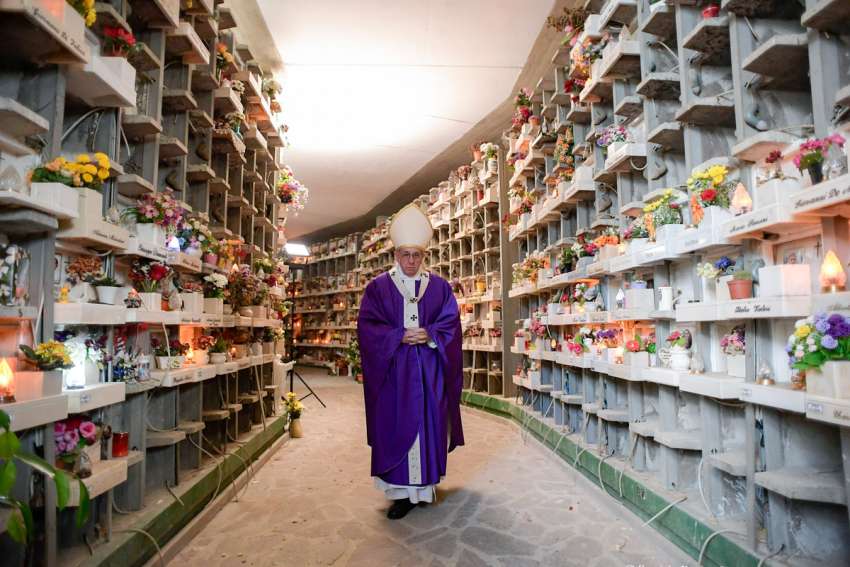VATICAN CITY -- The Vatican Dicastery for the Doctrine of the Faith has upheld a rule mandating that the ashes of the deceased be preserved in a consecrated place, but it also said family members could request "a minimal part of the ashes" be kept in a sacred place "of significance for the history of the deceased person."
The dicastery also said a parish or diocese could establish "a defined and permanent sacred place" where the cremains of multiple people would be commingled and preserved together.
The permission came in a "note" from the dicastery in response to a letter from Italian Cardinal Matteo Zuppi of Bologna requesting clarification about the preservation of the ashes of the deceased after cremation. The Vatican published the note signed by Cardinal Víctor Fernández, dicastery prefect, Dec. 12; it said it was approved by Pope Francis Dec. 9.
Cardinal Zuppi said in his letter, dated Oct. 30, that his archdiocese had been seeking "to give a Christian response to problems arising from the increasing number of people desiring to cremate the bodies of the deceased and scatter their ashes in nature."
An archdiocesan commission he set up to study the matter wanted to ensure people were not compelled to scatter ashes due to the economic costs of burial, and it wanted to give guidance regarding what to do with ashes once the term for their preservation in a cemetery loculus or niche had expired. In most Italian cemeteries, if a family does not renew the lease on a burial spot, the bones or ashes are transferred to a communal ossuary or cinerary.
The cardinal asked that, given "the canonical prohibition against scattering the ashes of the deceased, is it possible to prepare a defined and permanent sacred place for the commingled accumulation and preservation of the ashes of the baptized, indicating the basic details of each person so as not to lose the memory of their names, similar to what occurs in ossuaries."
He also asked if a family may be allowed "to keep a portion of their family member's ashes in a place that is significant for the history of the deceased."
Referring to its 2016 instruction, "Ad resurgendum cum Christo" ("To Rise with Christ"), regarding the burial of the deceased and the conservation of the ashes in the case of cremation, the dicastery's new note upheld its recommendation to preserve ashes in a special urn and to keep ashes "in a sacred place, such as a cemetery, or in an area dedicated to this purpose, provided that it has been so designated by the ecclesiastical authority."
"An attitude of sacred respect" must be had toward the ashes of the deceased person, which are to be kept in "a sacred place suitable for prayer," it added.
The faith teaches that "the body of the resurrected person will not necessarily consist of the same elements that it had before it died. Since it is not a simple revivification of the corpse, the resurrection can occur even if the body has been totally destroyed or dispersed," it said. This is why "in many cinerary urns, the ashes of the deceased are conserved together and are not stored separately."
Therefore, the dicastery said, "a defined and permanent sacred place can be set aside for the commingled accumulation and preservation of the ashes of deceased baptized persons, indicating the identity of each person so as not to lose the memory of their names."
In addition, it said, "the ecclesiastical authority, in compliance with current civil norms, may consider and evaluate a request by a family to preserve in an appropriate way a minimal part of the ashes of their relative in a place of significance for the history of the deceased person."
However, the authorization can be given only if "every type of pantheistic, naturalistic or nihilistic misunderstanding is ruled out and also provided that the ashes of the deceased are kept in a sacred place," the dicastery said.
The dicastery had issued an instruction in 1963 permitting cremation as long as it was not done as a sign of denial of the basic Christian belief in the resurrection of the dead. The permission was incorporated into the Code of Canon Law in 1983 and the Code of Canons of the Eastern Churches in 1990.
However, since church law had not specified exactly what should be done with "cremains," the dicastery provided further guidance with the 2016 instruction, "Ad resurgendum cum Christo" ("To Rise with Christ").
That instruction emphasized the Catholic Church's recommendation to follow "the most ancient Christian tradition" of the pious practice of burying the dead in cemeteries or other sacred places, as it is considered one of the corporal works of mercy and, mirroring the burial of Christ, more clearly expresses hope in the resurrection when the person's body and soul will be reunited.
Anonymous burial or scattering of ashes is not compatible with the Christian faith, according to the instruction. Preserving the ashes of the departed in a sacred place "ensures that they are not excluded from the prayers and remembrance of their family or the Christian community" and "it prevents any unfitting or superstitious practices."
"The conservation of ashes of the departed in a domestic residence is not permitted," the 2016 instruction said. "Only in grave and exceptional cases dependent on cultural conditions of a localized nature, may the Ordinary, in agreement with the Episcopal Conference or the Synod of Bishops of the Oriental Churches, concede permission for the conservation of the ashes of the departed in a domestic residence."
"The ashes may not be divided among various family members and due respect must be maintained regarding the circumstances of such a conservation," it said.


